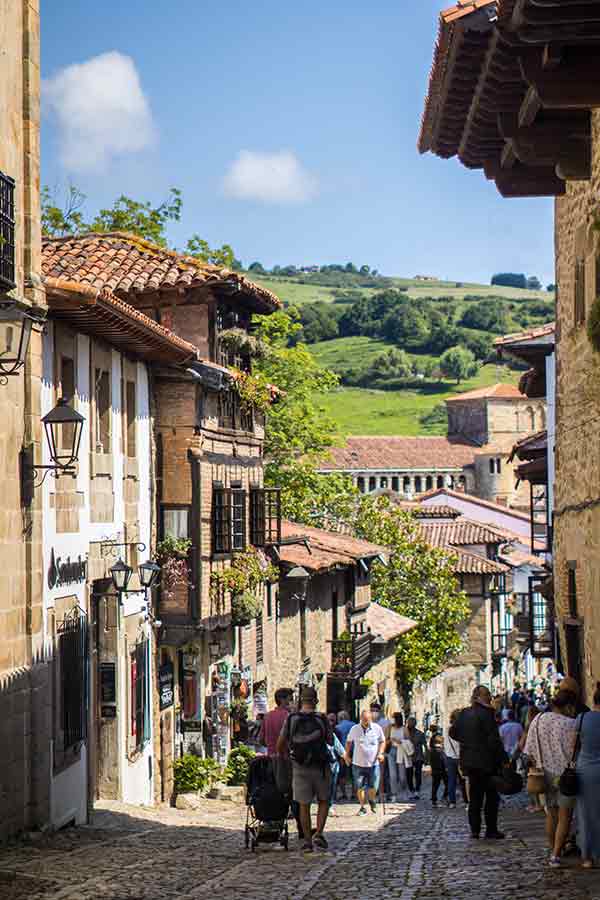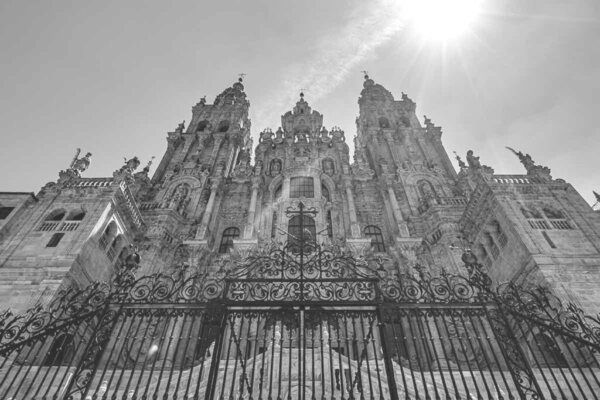These 25 basic Spanish expressions for beginners are your survival toolkits if you are thinking of coming to Spain on your holidays. Let’s say that you’ve watched a video on YouTube about Galicia and “El Camino de Santiago” and you just can’t wait to catch the plane to start your adventure. The only problem is that… your Spanish is not very good.
No worries at all!
In this post you’ll find colloquial Spanish expressions that will help you in many daily situations. Some of these basic Spanish expressions may be completely new for you, but rest assured I’ll explain its use in real context with useful examples. And what better way than to do it during a lovely trip along El Camino de Santiago?
In the first group of common Spanish expressions we’ll learn easy Spanish phrases to break the ice in a warm and polite way when you meet someone new.
1. Hola, buenos días, buenas tardes, buenas noches.
(Hello, good morning, good afternoon/good evening, good night)
Your trip begins in Santillana del Mar, Cantabria. A beautiful town on El Camino de Santiago and the first thing you do is… go to the bar. There, there is a girl who seems nice and pleasant, and you decide to talk to her.
The first thing you have to do is say hello and for this, it is okay to say “hola”. Then, depending on the time of day, you can say “buenos días” in the morning, before having lunch; “buenas tardes” after having lunch and until 19:30h (7:00 pm) – 20:00h (8:00 pm); “buenas noches” if it is almost dinner time or after dinner.
2. ¿Qué tal? ¿Qué tal estás? ¿Cómo estás?
(How are you? How are you doing?)
After greeting, if the girl doesn’t look at you and ignores you… then do not continue reading this article. But … if she answers you with a smile on her face, you can continue the conversation with one of these three easy Spanish phrases
“¿Qué tal?” It ‘s more informal.
“¿Qué tal estás?” And “¿cómo estás?” It’s a little more serious.
3. Me llamo… y tú, ¿cómo te llamas?
(My name is… and you, what’s your name?)
Your new friend probably answers the question “¿qué tal?” with “bien, gracias” and a big smile that invites you to have a beer or a glass of wine with her. It ‘s the moment to introduce yourself. For this you have to say your name and ask for hers: “me llamo… y tú, ¿cómo te llamas?”
4. Encantado/a de conocerte.
(Nice meeting you)
Las cosas van bien con tu nueva amiga. Para que vea lo simpático que eres, cuando ella diga su nombre, tu puedes Things are going smoothly with your new friend. For her to see how nice and polite you are, when she says her name, you should answer “encantado/a de conocerte”.
In the second group of basic Spanish expressions for beginners we’ll see easy Spanish phrases to continue speaking in a conversation once you’ve introduced yourself to the other person.

5. ¿De dónde eres?
(Where are you from?)
You are really enjoying your conversation with your new friend. So you’d like to know a little more about her. On El Camino de Santiago you can find pilgrims from all over the world. Therefore, a very good question is “¿de dónde eres?” to find out the nationality of your new friend.
6. ¿Tienes novio/novia/hijos…?
(Do you have a boyfriend/girlfriend/kids…?)
Ya te has tomado tres cervezas y estás cada vez You’ve already had three beers and you’re increasingly interested in your new friend 😉 So now is the time to ask a slightly more personal question and find out if she has a boyfriend/girlfriend/kids…
7. ¿Qué hora es?
(What time is it?)
Time has flown! And suddenly your new friend gets up and asks you “¿qué hora es?”… ¡Oh no! It’s really late… It’s 00:30h (12:30 am) and it’s time to sleep. El Camino de Santiago is a long trail and you have to get up at 5:30h (5:30am) to start walking.
8. ¿Cuál es tu número de teléfono?
(What is your phone number?)
But before you say goodbye, you want to get the phone number of your new friend to keep in touch. That ‘s why you ask her “¿cuál es tu número de teléfono?”
9. ¿Cuál es tu correo electrónico?
(What is your email address?)
Your new friend tells you she doesn’t have a phone… oh, oh… this is odd… Well, if she doesn’t have a phone, then you can ask her “¿cuál es tu correo electrónico?”
10. ¿Tienes Facebook, Instagram…?
(Do you have Facebook, Instagram…?)
WoW! She doesn’t have an email address either… this is really weird… We are in the 21st century! Well… in that case you can ask her “¿tienes Facebook, Instagram…?”
11. Adiós, hasta luego, hasta pronto, hasta mañana, nos vemos.
(Bye, see you later, see you soon, see you tomorrow, see you)
No phone, no email, no Facebook, no Instagram… either your new friend lives in the Middle Ages or… She doesn’t want to keep in touch with you! In any case, the time has come to say goodbye. For that, you can use any of the sentences mentioned in this point…. But in this particular case it’s better for you to say “¡adiós!”

In the third group of basic Spanish expressions for beginners we’ll learn easy Spanish phrases to ask for directions when you arrive in a new place.
12. ¿Hablas inglés? (informal) / ¿Habla inglés? (formal)
(Do you speak English?)
On your journey along El Camino de Santiago, you have arrived in Comillas. It is a beautiful town and you want to visit monuments, restaurants, churches, bars … On the streets, you meet a lady from the town who seems very nice and polite and you try your luck and ask her “¿habla inglés?” The lady looks at you as if you were an alien who just arrived from Mars and responds “¡No rapacín! ¿Me viste con cariña de hablar inglés?” Now, you are the one with the alien face. Well, the lady doesn’t speak English but… never mind! A beautiful part of the Camino de Santiago is to interact with local people in the area. So you decide to talk to this lady who doesn’t stop smiling while looking at you.
“Rapacín” and “cariña” are typical expressions from northern Spain. They mean “sweetheart” and “face”.
13. ¿Dónde está el/la…?
(Where is the…?)
Since you already know how to say “hola” and introduce yourself, you have found out that the lady’s name is Doña Milagros (Ms Miracles). Now you are going to ask her about two places you want to visit in Comillas: “¿dónde está el Capricho de Gaudí?” and “¿dónde está la Universidad Pontificia?”
14. Perdón, ¿puedes repetir, por favor? (informal) / ¿puede repetir, por favor? (formal)
(Can you repeat, please (informal) / Could you repeat, please? (formal)
Doña Milagros has been speaking in Spanish for 10 minutes, trying to explain to you how to get to these two monuments in Comillas. You can understand some words but not all. Luckily, Doña Milagros besides being nice and polite, she is also a very patient person and she explains it to you again when you ask her “perdón, ¿puede repetir por favor?”
15. Lo siento, no lo entiendo.
(I’m sorry, I don’t understand it)
Now, Doña Milagros, not only is she repeating the same information with the same words…but she is also speaking much louder…Almost screaming! As if you were deaf!
Finally, you have to tell her “lo siento, no lo entiendo” and say goodbye with a smile “¡hasta pronto!”
16. ¿Hay un/una… cerca?
(Is there any… nearby?)
Your trip began in Santillana del Mar and after that, you arrived in Comillas. You continued travelling and now you are in San Vicente de la Barquera, another lovely town in the Camino de Santiago with marvellous beaches and medieval monuments.
After your experience with Doña Milagros, you decide to speak directly to a local police officer to ask if “¿hay un hotel cerca?”, “¿hay un cajero automático cerca?”, “¿hay un hospital cerca?”, “¿hay un museo cerca?”, “¿hay una parada de autobús cerca?”
The policeman looks at you half laughing and says “¡Pues claro! Aquí todo está cerca. ¡Es un pueblo muy pequeño!” – “Well of course! Everything here is nearby! This is a very small town!”
17. ¿Cómo voy a…?
Fantastic! If it is a very small town, you can ask for directions to get to all these places and there is no chance that you will get lost. So you decide to take advantage and practice your Spanish with the policeman a bit: “¿cómo voy al hotel?”, “¿cómo voy al cajero automático?”, “¿cómo voy al museo?”, “¿cómo voy a la parada de autobús?”
In the fourth and last group of basic Spanish expressions for beginners we’ll see easy Spanish phrases to use in bars, restaurants and shops.

18. Quiero… una cerveza/ una copa de vino/ un café/ una botella de agua, por favor.
(I’d like a beer/a glass of wine/a coffee/a bottle of water, please)
In less than 30 minutes you have found all the places you were looking for and also… You have reached the best restaurant in town!
Now, it’s time for you to understand that the verb “querer” – “to want”- in Spanish is a very common verb. In other languages, such as English, it may seem rude to say “I want a beer”. But in Spanish, it ‘s ok. It’s usual to use the verb “querer” to order something in a bar or a restaurant or to ask for a product in a shop or supermarket.
So when you talk to the restaurant waiter you say “quiero una cerveza, por favor”.
19. ¿Dónde está el baño?
(Where is the bathroom?)
Wonderful! What delicious seafood! What a pleasant waiter! What a beautiful sea landscape that you can see from your restaurant table! Now, you just need to go to the bathroom.
20. Camarero/a, la cuenta, por favor.
(Waiter/Waitress, the bill, please)
You are ready to pay for your meal and continue your journey, so with a smile and raising a hand energetically you say “camarero, la cuenta, por favor”.
21. Quédate con el cambio.
(Keep the change)
The service has been very good, the Spanish food was delicious, the bathrooms were clean…What more can you ask for? You paid with a 50 euro bill and Pepe (the waiter who has served you) gives you back 3 euros with 50 cents. In this case, the best thing to do is to say “Pepe amigo, quédate con el cambio”.
22. ¿Cuánto cuesta?
(How much is it?)
You have finally reached the end of the road: Santiago de Compostela. You feel very happy and accomplished!
It has been a fantastic experience and you want to buy gifts and souvenirs for your family and friends back home. You walk into a nice local craft store and ask the clerk “¿cuánto cuesta?” to know the price of the objects that you would like to buy.
23. ¿Puedo pagar con tarjeta? ¿Puedo paga en efectivo?
(Can I pay with a card? Can I pay in cash?)
These two questions are very useful in any type of place, shops, market, museum, monument, bar, restaurant…
24. ¡Llama a una ambulancia! ¡Llama a la policía!
(Call an ambulance! Call the police!)
We all want to have quiet and relaxed holidays but … There may have been an accident! In that case, these are the two phrases you need. You also have to know that in Spain, the emergency number is 112. Calls are free.

We can call the last group of easy Spanish phrases “the magic words” because you can use them in any situation, in any country and with anyone.
25. Por favor, (muchas) gracias.
(Please, thank you (very much))
If you accompany a phrase with these words and a smile on your face, it will always help improve your conversation. Would you like to see an example?
“If you want to improve your Spanish, we can help. Book your trial lesson with one of our expert native teachers and muchas gracias for reading this article!”
¡Hasta pronto!”
